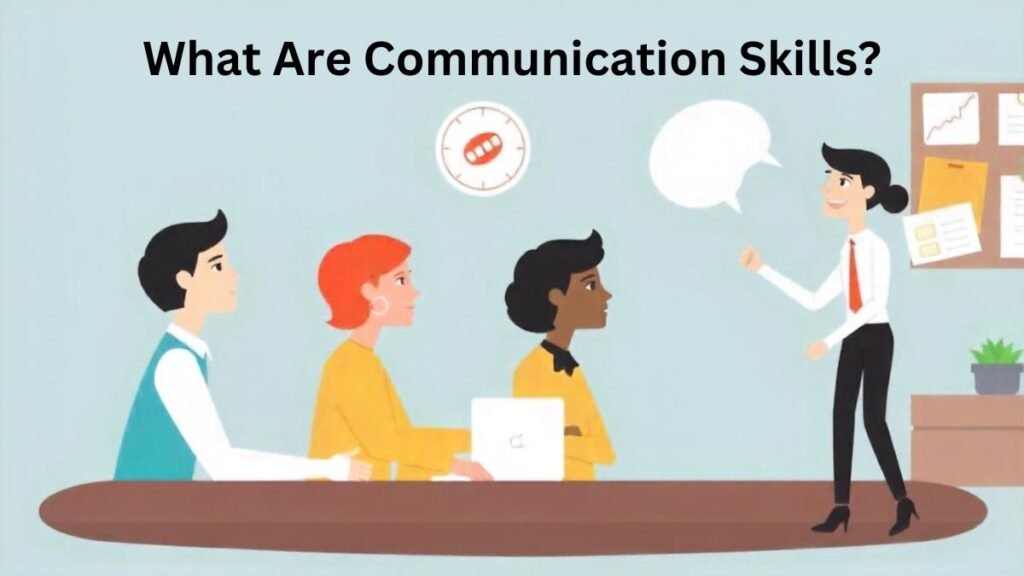Communication is the cornerstone of every successful career. Whether you are working in a team, interacting with clients, or engaging in networking opportunities, the ability to express yourself clearly and listen actively can make or break your professional success. Effective communication skills are essential for building strong relationships, resolving conflicts, and demonstrating leadership. If you’re looking to advance in your career, mastering these skills will be one of the most powerful investments you can make.
In this blog post, we will explore the importance of communication skills, how to develop them, and how they contribute to career success. Whether you’re just starting in your career or looking to enhance your abilities, this guide will give you actionable tips to improve your communication skills for long-term professional growth.
What Are Communication Skills?
At its core, communication is the process of sharing information, thoughts, and ideas. Communication skills refer to the ability to convey messages clearly, listen to others attentively, and interact effectively in various situations. These skills are not limited to speaking or writing; they also include non-verbal communication such as body language, facial expressions, and tone of voice.

Communication skills can be divided into several key areas:
Verbal Communication: This is the most common form of communication, which includes speaking clearly, using appropriate language, and expressing your thoughts logically.
Non-Verbal Communication: The use of body language, facial expressions, eye contact, and gestures. Non-verbal signals often convey more than words can express.
Written Communication: This includes emails, reports, memos, and other written forms of communication. In professional environments, writing clearly and concisely is crucial.
Listening Skills: Listening actively and attentively is just as important as speaking. Good listening ensures that you understand others’ perspectives and can respond appropriately.
Interpersonal Skills: The ability to engage in positive and effective interactions with others, including empathy, patience, and emotional intelligence.
Mastering all these aspects of communication will significantly improve your interactions at work and help you build stronger professional relationships.
Why Are Communication Skills Important for Career Success?
-
Builds Strong Relationships
Effective communication is the foundation of all strong professional relationships. Whether you’re working in a team, managing employees, or dealing with clients, being able to communicate clearly and effectively helps you build trust and credibility. When you express yourself well and listen to others attentively, it makes people feel valued, which strengthens relationships and improves collaboration.
-
Enhances Leadership Abilities
Effective communication is often a hallmark of strong leadership. A good leader must be able to convey their vision, motivate their team, and resolve conflicts with diplomacy. Strong communication skills also make it easier for leaders to provide feedback, give clear instructions, and inspire confidence in their decisions. Without good communication, even the most skilled leaders may struggle to guide their teams toward success.
-
Facilitates Career Advancement
One of the main drivers of career success is the ability to express yourself and demonstrate your value to others. Whether you’re networking at events, presenting in meetings, or communicating with your superiors, your communication skills play a vital role in how you’re perceived. Clear and confident communication helps you articulate your ideas and achievements, which can lead to promotions, raises, and new opportunities.
-
Reduces Misunderstandings and Conflicts
Poor communication often leads to misunderstandings, mistakes, and conflicts. In the workplace, this can create tension and reduce productivity. Effective communicators can express their needs, concerns, and expectations clearly, which minimizes the risk of miscommunication and conflict. By listening actively and being mindful of others’ perspectives, you can prevent many issues from arising in the first place.
-
Improves Problem-Solving and Decision-Making
Good communication skills are essential for problem-solving. When you can articulate problems clearly and listen to feedback from others, you’re in a better position to find effective solutions. Moreover, the ability to communicate your thought process and collaborate with colleagues improves decision-making, especially in team settings.
How to Improve Your Communication Skills for Professional Advancement
Now that you understand why communication skills are important for career success, let’s explore how you can improve them. There are several practical strategies you can implement to become a more effective communicator:
-
Work on Your Listening Skills
Listening is often overlooked in the communication process, but it’s just as important as speaking. Active listening means fully concentrating on what the other person is saying rather than just waiting for your turn to talk. When you listen actively, you show respect for the speaker, understand their message more clearly, and can respond appropriately.
To improve your listening skills:
Maintain eye contact.
Nod or give small verbal cues (e.g., “I see,” “Interesting”).
Avoid interrupting the speaker.
Focus on comprehending the underlying message, not just the words.
Ask clarifying questions if needed.
-
Be Clear and Concise
In both verbal and written communication, it’s essential to get to the point without unnecessary elaboration. When you speak or write clearly and concisely, your message is easier to understand, and your audience is more likely to retain the information.
To improve clarity:
Organize your thoughts before speaking or writing.
Steer clear of technical terms or complicated language that could confuse your audience.
Keep your sentences simple and centered around one core idea.
Use bullet points, headings, and lists in written communication for better readability.
-
Practice Non-Verbal Communication
Your body language, expressions, and tone all play a significant role in conveying meaning. In many cases, non-verbal communication can be more powerful than words. For instance, maintaining an open posture and making eye contact during a conversation shows that you’re engaged and confident.
To improve non-verbal communication:
Keep your posture open and relaxed by not crossing your arms while sitting or standing.
Make eye contact but don’t stare.
Use gestures to emphasize key points.
Be aware of your facial expressions, especially when discussing sensitive topics.
-
Adapt to Your Audience
Effective communicators can adjust their communication style based on their audience. Whether you’re speaking to a colleague, a manager, or a client, it’s important to adapt your tone, language, and level of detail to suit the context and the person you’re communicating with.

To adapt to your audience:
Be mindful of the cultural and professional differences of those you interact with.
Consider the level of expertise your audience has and adjust your language accordingly.
Tailor your message based on the person’s needs, interests, and concerns.
-
Develop Emotional Intelligence (EQ)
Emotional intelligence (EQ) involves understanding and managing both your emotions and the feelings of others. High EQ helps you navigate social situations and respond to others with empathy and understanding. This is especially important when resolving conflicts or dealing with sensitive issues in the workplace.
To develop emotional intelligence:
Be self-aware of your emotions and reactions.
Practice empathy by putting yourself in others’ shoes.
Stay calm and composed during stressful conversations.
Use constructive feedback instead of criticism when talking to others.
-
Seek Feedback and Practice Regularly
Improving communication skills is a continuous process. Solicit feedback from peers, mentors, or supervisors to improve your communication style. Practice regularly, whether in meetings, one-on-one conversations, or presentations. The more you practice, the more natural and confident your communication will become.
Where Can Communication Skills Be Applied in Your Career?
Communication skills are applicable in every job and industry. Some key areas where they are particularly important include:
Client Interactions: Whether you’re answering questions, giving advice, or negotiating deals, clear communication is essential for building trust and understanding with clients.
Team Collaboration: Effective communication helps you collaborate with colleagues, exchange ideas, and work together toward shared goals.
Leadership and Management: Leaders must communicate their vision, goals, and expectations clearly to inspire and motivate their teams.
Sales and Marketing: Salespeople need to communicate the benefits of a product or service persuasively, while marketers must craft compelling messages to attract and engage customers.
Networking: Networking is about building relationships, and the ability to introduce yourself clearly, listen attentively, and engage in meaningful conversations is vital.
Key Takeaways
Effective communication skills are crucial for career success as they help you build strong relationships, enhance leadership abilities, and facilitate career advancement.
Communication encompasses verbal, non-verbal, written, and listening skills. All these skills are equally important in creating meaningful interactions.
To improve your communication skills, focus on active listening, clarity, non-verbal cues, adaptability, emotional intelligence, and regular practice.
Communication is essential in every industry and job role. The more proficient you become, the more likely you are to advance in your career.
(FAQs)
- How do I know if my communication skills need improvement?
If you struggle to get your ideas across clearly, often misunderstand others, or receive feedback that you’re not communicating effectively, it may be time to work on improving your skills. Receiving feedback from colleagues or mentors offers valuable perspectives.
- How can I improve my communication in team settings?
To improve communication in teams, ensure you’re actively listening to others, contributing clearly, and respecting everyone’s ideas. Create an atmosphere where everyone feels safe to share their opinions and concerns.
- Is public speaking the same as communication?
Public speaking is a form of communication, but not all communication requires public speaking. Effective communication can happen in one-on-one interactions, team meetings, or emails. Public speaking, however, often requires additional skills like managing stage fright and engaging a larger audience.
- Can communication skills be learned?
Yes, communication skills can be learned and improved over time. With consistent practice and a willingness to learn from feedback, anyone can develop stronger communication abilities.
Conclusion
Mastering communication skills is one of the most valuable things you can do for your career. From building strong relationships to enhancing leadership abilities and facilitating career advancement, effective communication is crucial for success. By developing your listening, speaking, writing, and non-verbal communication skills, you can significantly boost your professional growth and build the confidence needed to succeed in any industry. Keep practicing, stay open to feedback, and remember that good communication is always a work in progress.